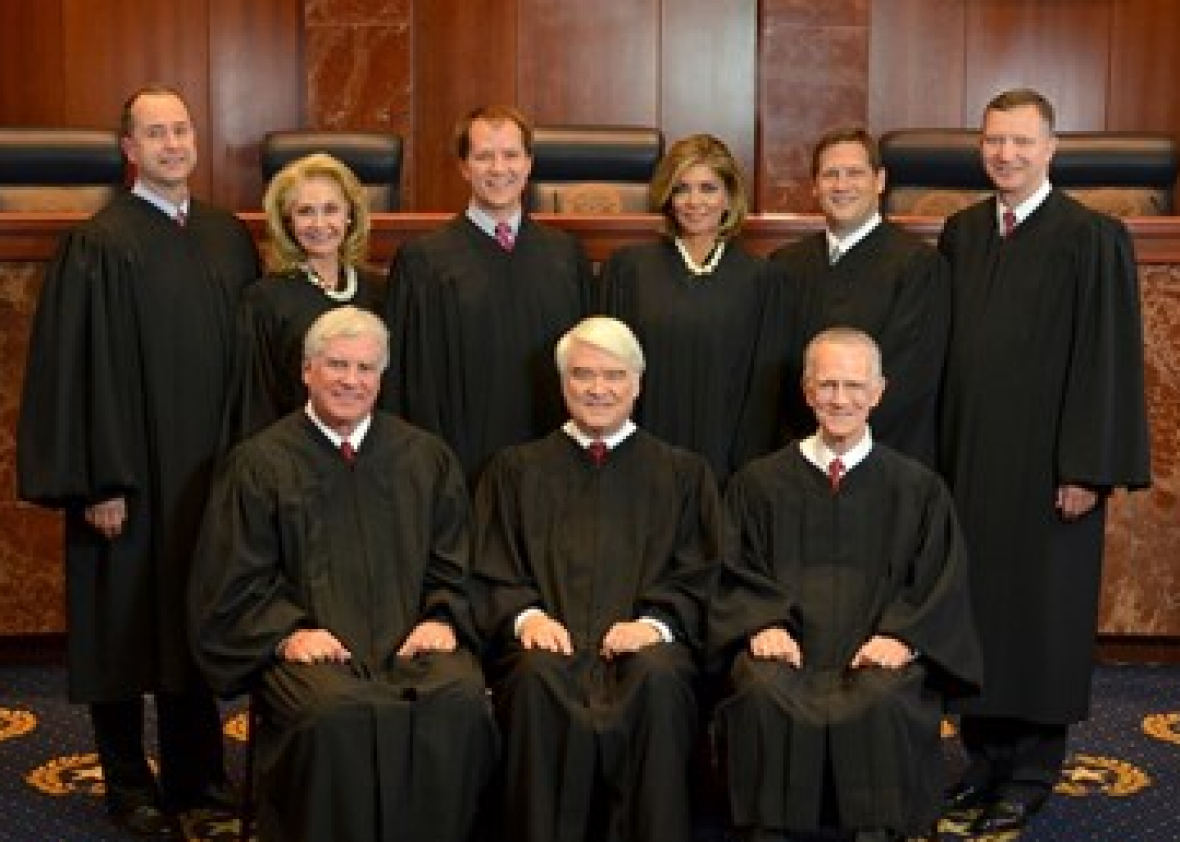On Friday, the Texas Supreme Court refused to review a lower court ruling holding that cities may not deprive married same-sex couples the benefits it provides to opposite-sex couples. The court’s decision leaves in place a pro-equality ruling that forbids the government from discriminating against gay people for no good reason. But one judge, Justice John Devine, argued that his court should have taken the case and reversed the lower court’s judgment. His opinion is an ominous sign that conservative judges are striving to work around Obergefell v. Hodges and affirm the constitutionality of state-sponsored anti-gay discrimination.
Devine is clearly no fan of Obergefell, and his dissent attempts to minimize that decision to an almost dishonest degree. “Marriage is a fundamental right,” Devine wrote. “Spousal benefits are not.” Devine insisted that Obergefell’s affirmation of same-sex couples’ constitutional right to wed does not preclude Texas from discriminating against married, same-sex couples in other ways. Obergefell, the justice argued, was strictly limited to gay people’s fundamental right to marry. So long as a state does not revoke that right, it can deprive same-sex couples of other benefits guaranteed to opposite-sex couples. Specifically, Devine wrote, the government can refuse to give spousal benefits to its gay employees because they are gay.
Why should Texas be permitted to deprive same-sex couples of the benefits provided to opposite-sex couples? Because the state has an “interest in encouraging procreation.” Devine speculates that “offering certain benefits to opposite-sex couples would encourage procreation within marriage.”
After all, benefits such as health insurance provide financial security as couples decide whether to have a child. An opposite-sex marriage is the only marital relationship where children are raised by their biological parents. In any other relationship, the child must be removed from at least one natural parent, perhaps two, before being adopted by her new parent(s). This does not diminish any child’s inherent dignity, a fact the City presumably recognizes by extending benefits to their employees’ children regardless of the employees’ marital status. But it does explain why the State might choose to direct resources to opposite-sex couples.
This argument is profoundly insulting to nonbiological children: It suggests that a gay employee’s nonbiological child, birthed by the employee’s same-sex spouse, is not as worthy of state “resources” as an employee’s biological child would be. (Why would such a child be less deserving of state benefits? Devine doesn’t attempt to explain—and cannot, as the Supreme Court’s decision in United States v. Windsor spoke scathingly of the government’s efforts to “humiliate” the children of same-sex couples by treating their parents unequally.)
Really, though, the bigger problem here is that Devine simply butchers Obergefell beyond recognition. The justice utterly overlooks the fact that Obergefell, like Windsor, has an Equal Protection component that is critical to its holding. In Obergefell, the court wrote that states may not “exclude same-sex couples from civil marriage on the same terms and conditions as opposite-sex couples.” Devine insists that the “terms and conditions” of marriage are nothing more than the laws governing marriage, like minimum age statutes and bigamy bans.
That is really quite absurd. As every other court to consider the issue has recognized, this provision of Obergefell requires states to extend the same benefits to married same-sex couples that it does to married opposite-sex couples. That, at a bare minimum, is what Obergefell’s Equal Protection analysis obviously requires.
Devine secured his spot on the Texas Supreme Court during a Tea Party wave, allegedly declaring that he could defeat incumbent David Medina because “I can beat a guy with a Mexican last name.” He is best known for refusing to remove a painting of the Ten Commandments from his courtroom as a lower court judge, illegally using his chambers for a conservative political event, and speaking at anti-abortion rallies. His dissent on Friday fits neatly into his life’s pattern of placing his personal politics before judicial principles. It is a disturbing reminder that far-right judges remain eager to chip away at Obergefell and that our next Supreme Court justice will have the power to reject this kind of sophistry—or write it into law.
